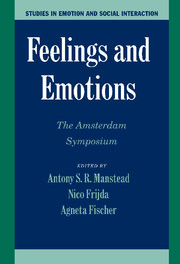Book contents
- Frontmatter
- Contents
- List of Contributors
- 1 Introduction
- PART I THE NATURE OF FEELINGS AND EMOTIONS
- PART II BASIC PSYCHOLOGICAL PROCESSES IN FEELINGS AND EMOTIONS
- PART III FEELINGS AND EMOTIONS: THE PLACE OF PLEASURE
- PART IV FEELINGS AND EMOTIONS IN THEIR SOCIOCULTURAL CONTEXT
- 18 The Development of Individual Differences in Understanding Emotion and Mind
- 19 Emotional Intelligence
- 20 Culture and Emotion
- 21 Emotion Norms, Emotion Work, and Social Order
- PART V FEELINGS, EMOTIONS, AND MORALITY
- Subject Index
- Author Index
- Plate section
- References
19 - Emotional Intelligence
What Do We Know?
Published online by Cambridge University Press: 05 June 2012
- Frontmatter
- Contents
- List of Contributors
- 1 Introduction
- PART I THE NATURE OF FEELINGS AND EMOTIONS
- PART II BASIC PSYCHOLOGICAL PROCESSES IN FEELINGS AND EMOTIONS
- PART III FEELINGS AND EMOTIONS: THE PLACE OF PLEASURE
- PART IV FEELINGS AND EMOTIONS IN THEIR SOCIOCULTURAL CONTEXT
- 18 The Development of Individual Differences in Understanding Emotion and Mind
- 19 Emotional Intelligence
- 20 Culture and Emotion
- 21 Emotion Norms, Emotion Work, and Social Order
- PART V FEELINGS, EMOTIONS, AND MORALITY
- Subject Index
- Author Index
- Plate section
- References
Summary
ABSTRACT
This chapter describes recent advances in the scientific study of emotional intelligence. Setting the idea of an emotional intelligence in a historical context, the authors' four-branch model of these competencies is then described. Research on the measurement of emotional intelligence, especially as a set of abilities rather than as self-reported personality traits, is described. The psychometric properties of a new measure of emotional intelligence, the Mayer-Salovey-Caruso Emotional Intelligence Test (MSCEIT), are presented, as are preliminary findings concerning the predictive validity of this construct in the domains of family, school, and workplace.
The starting point for the idea that there could be an emotional intelligence is that, rather than “hijacking” one's thoughts and behaviors (Goleman, 1995, p. 13), emotions often serve adaptive, purposeful, and helpful functions (Leeper, 1948). It is the emotional system, in this view, that focuses attention, organizes memory, helps us to interpret social situations, and motivates relevant behavior. Accordingly, it makes little sense to place emotions in opposition to reason and rationality (de Sousa, 1987). The concept of emotional intelligence, which elsewhere (e.g., Mayer & Salovey, 1997) we have defined as the ability to perceive, understand, manage, and use emotional information, simply takes this functionalist perspective one step further by calling attention to the need for research on individual differences in the ability to reason about emotions and to use emotions in reasoning.
- Type
- Chapter
- Information
- Feelings and EmotionsThe Amsterdam Symposium, pp. 321 - 340Publisher: Cambridge University PressPrint publication year: 2004
References
- 35
- Cited by

